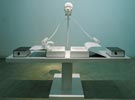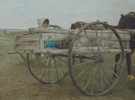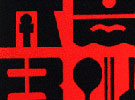Confidence in Intuition – A Dialogue after “30 Days – Zhou Bin Project”
Zhang Yinchuan & Zhou Bin
Zhang Yinchuan (art theorist, hereinafter referring to Zhang)
Zhang: You often read works by artists of the Japanese “Mono-ha” movement. Why are you interested in “Mono-ha”?
Zhou: I came across the Mono-ha artists in the early nineties. Their extensive but simple works touched my inner heart, and from that time onwards my art began to develop.
Zhang: It seems that there has been a wave of interest in the Eastern Mono-ha in the last years.
Zhou: You can definitely see the interest towards Mono-ha in my works, an unconscious influence is given. The idea of the Mono-ha originated in clearly criticizing the blind following of the European-American (Western) traditions, the shortcomings of loneliness and subjectivity and other major problems in modern society. This could actually have a healing effect on the boasting and overstated Chinese art scene of today。
Zhang: You moved the audience with your performance “30 days – Zhou Bin Project” which you recently performed at the No. 17 Liaogezi Gallery in the 798 art district in Beijing. What were your feelings after the project concluded?
Zhou: The reactions were positive. In the 30 days I got to think a lot, I went through a thorough cleansing of myself which I had never experienced before. I felt really at ease and I think a peaceful mind is very important for an artist.
Zhang: I am very sensitive towards your “project”, from the first planning to the actual performance. “Chance”, “uncertainty”, “daily fragments”, “narrating the microcosmic”, or “self-awareness” - some of these topics are discussed and perceived as several different concepts by various art theoreticians. But in your performance the reflection of these topics seems very natural. Once you start performing, it becomes clear that you want to “concentrate on the natural self, the simple emotions, and value the unpredictable sudden feelings.” Are you that aware of yourself?
Zhou: All along I thought that the intuitive experience was the sole creative basis for an artist but actually this is based on long-term examination and practicing of art. I think that it is important that each phase of artistic creation is accompanied by intense reading and thinking. But at some point you have to abort the theoretical and solely focus on your instinct and experience. Believe in your instinct although there might not have been a position in theory. Don’t think too much, dare to go wrong. The value of experimenting lies in here and only this kind of artist is worth the respect. Art has no set rules and good art naturally overcomes what has been. Rely on yourself because the outcome depends on your own special gift.
Zhang:Do you worry about being misread?
Zhou: Misreading is always possible, there are even some art works made with the intention to be misread by the viewer. In the “30 days project” I have one work which is called “Misreading test”. I invited eight visitors who saw the “30 Days Project” to just choose three exhibition works which they liked and interpret them. The result was that the interpretations were all really different. There was a veteran worker who said that he just did not understand the works.
Zhang: That reminds me of a piece of yours that you performed seven years ago called “Chasing the Sun”. One person stood on top of a building from sunrise to sunset for twelve hours, experiencing his bodily reactions while and after the performance. In the end you said that this work was a try for yourself to use the most simple action language to carry out a representative work that expresses meaninglessness. Especially two ideas got my attention: “the most simple action language” and “the expressing of meaninglessness”.
Zhou: In my actions I reject complexity and exhibitional body language. “Simple” means natural body language. With “meaninglessness” I want to make people aware that not only meaningful things have a meaning, art works can sometimes move people in bewildering ways.
Zhang: Do you really tell your friends that you are a “traditional performance artist”?
Zhou: That only happens when we stress the high moral standard of our works and the importance of it for mankind. You have to be able to laugh at yourself.
Zhang: Performance art has a 20 year history in China and about 10 years in Chengdu. From you I heard for the first time that self-examination of performance art now is still a rough soul search.
Zhou: Two years ago I talked to Singapore artist Li Wen. He said that Chinese performance art is not good. I asked him if he was drunk. But later I thought about why he had said that, I thought it was a lack of understanding. Li Wen might not have received the full influence when he saw the work, he concentrated on the language of the work itself at that time, and many pieces are misread in this way. The opinion of Li Wen made me alert. Objectively said, many Chinese artists are still in the phase of instrumental sing performance art in a simple way, the creative approach is a crude shout, an outlet of emotions. I always thought that the influence of art on big topics is similar to dripping water. We establish ourselves as visual artists, so we first want to solve the technological problems of visual displays and the language problems. But I think this is part where Chinese artists still have to learn a lot.
Zhang: Give the Chinese performance artists a lesson in expression techniques?
Zhou: The key to the techniques of performance art is experience. It does not seem difficult but if you don't have experience it is difficult to get your piece of art to work. I often give the example of nudity in a performance work. First you have to think about the freedom of nudity. Do you enter the stage dressed or naked? If you take off your clothes on stage, are you facing the audience or turning your back on them? What do you take off first, the shoes or the clothes? How much time do you take to undress? Do you tear off your clothes or put them neatly on a pile on the floor? And so on. These are all techniques and experiences. Why is it that the audience falls silent at once when a good artist enters the stage? There are some artists that instruct someone to tell the audience to keep quiet after they come on stage. That is the difference in technological standards. Good artists use their experience and emotions on stage to create powerful energy. This is the technique of a performance artist.




